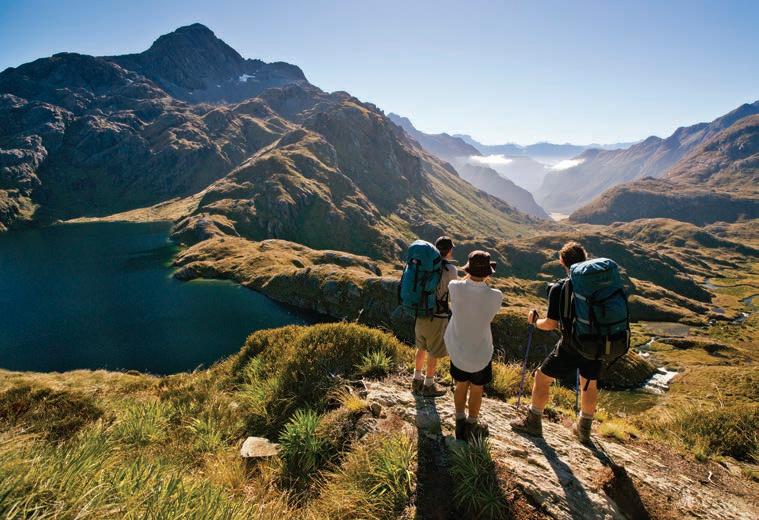
3 minute read
GETTING THE WORD OUT - NZ OPEN FOR BUSINESS
By Sue Fea
New Zealand’s tourism industry is working hard to combat any fall-out with international visitor markets from the devastating cyclone and flooding which has ravaged parts of the North Island.

While it’s early days and everybody in the industry is focused on feeling for and supporting those who’ve lost homes and businesses in the north, some operators have already experienced cancellations.
A lack of geographical knowledge can create the impression that the whole country is affected when realistically even most of Hawkes Bay and the Coromandel are open for business. It happened after news of the Christchurch earthquakes travelled around the globe, operators say.
The Rees CEO Mark Rose, whose hotel largely caters for international visitors says he’s already seen fall-out with cancellations from some American and Indian bookings, based on what they’ve heard. “However, they’re small in the scheme of things,” he says. “We’ve been in contact with our agents in the US, people who are on the road. Some visitors were going to cancel Rotorua, but I said, No! Rotorua is open,” says Mark. “They just don’t have that awareness of where places are in NZ.”
North Island operators have had terrible problems finding enough alternative beds for affected visitors. “They’ve had major disruption. It’s been horrific for them, especially right after Covid,” says Mark, whose staff are fundraising for cyclone and flood victims with the hotel owners matching what they raise. That money will go to Wakatipu High School in its bid to fundraise to support families of Hastings Boys High School students.
Tourism Export Council CEO Lynda Keene says there will undoubtedly be cancellations with February, March and April predominantly the international visitor season. Visitors in the country when the disasters struck, who’d booked their own travel, were worst affected, but those booked through offshore travel agents and inbound tour operators were less so. “Some visitors cancelled and decided not to travel the rest of NZ.”
Anecdotally, inbound operators are seeing some cancellations for March and April, she says. Key international markets that have returned since borders re-opened, include Australia, US, Canada, Singaporeans and UK visitors. Operators around NZ feel for the affected regions still under a lot of stress, she says. “A lot of families have lost homes and businesses. Their world’s turned upside down.”
Totally Tourism Director Mark Quickfall says the Tourism Export Council has been proactive keeping operators informed about air, roads and ferry sailings and other vital information. He hasn’t noticed any cancellations yet. “We’ve learned to respond quickly after the Christchurch earthquakes, and then Covid,” he says. “One week we were open for business then the next week we were closed.” He believes NZ will manage those communications well as a result, getting the word out internationally that the rest of NZ, and much of the affected areas, are still open for business. “There’s a huge amount of sympathy among South Island operators. Here we are living in sunshine, a normal life, and we really feel for them,” says Mark.
Queenstown operators are always generous to respond to situations like this. Mark says he wouldn’t be surprised if key tourism organisations in the country come up with a plan to offer coordinated kindness in some form to cyclone and flood victims further down the track. “We would be more than happy to be part of that.”
Neither Millbrook Resort nor Novotel Queenstown Lakeside general managers have noticed any major fall-out. Novotel’s Jim Moore says, understandably, he lost some insurance conference bookings when the floods hit Auckland. It’s also been harder for suppliers to source food and vegetables, says Jim, but great to see this community backing fundraising initiatives with a need so great.
Tourism Industry Aotearoa CE Rebecca Ingram says manuhiri (visitors) were well looked after by tourism and tour operators, the i-SITE network and those on the ground, which should hopefully set NZ in good stead overseas. Visitors were mostly very understanding and coped well, with many naturally changing their itineraries in response to spend more time in different parts of NZ. Offshore travel partners are being made aware that many parts of NZ were unaffected, and continued to welcome visitors.
“Tourism NZ and inbound tour operators’ work to ensure that travel trade partners have up to date information which is invaluable at times like this,” says Rebecca.
“The extreme weather events have offered us timely, real-life examples of why a regenerative tourism system is the only way forward for Aotearoa New Zealand,” says Rebecca.
Tourism NZ Communications Manager Candice Johanson says offshore news coverage was minimal and didn’t last long. “Our offshore trade teams are working closely with offshore trade to ensure they have accurate information to support any booking queries or concerns,” says Candice.
Air NZ General Manager Domestic Iain Walker says the immediate focus has been those devastated by the floods and cyclone, offering special low fares, increase travel flexibility and connecting the Tairāwhiti and the Hawkes Bay region with a temporary direct flight. “While we’re seeing some travellers change or cancel their plans, this is also freeing up seats for those urgently needing to travel in and out of these regions.” There’s still strong inbound demand to all regions in NZ.










